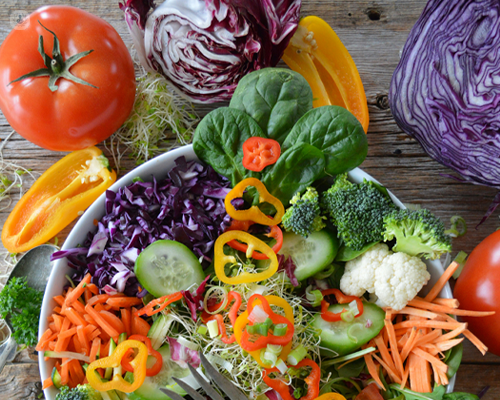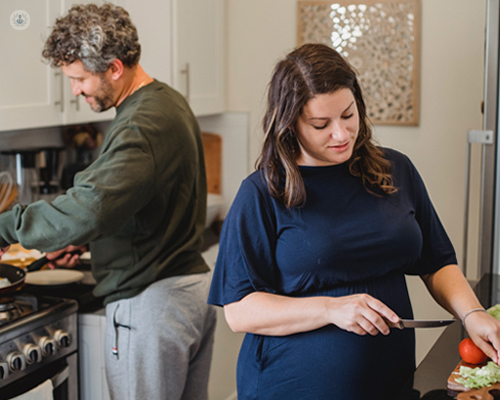What foods really fight cancer?
Escrito por:“Health is a state of complete physical, mental, and social well-being and not merely the absence of disease or infirmity” - World Health Organization, 1948. It’s been estimated that 30 per cent of the most common cancers can be prevented. Smoking, drinking, general lifestyle and stress create imbalance. In turn, this can exacerbate disease. Every aspect of medical care should be integrated into a patient’s treatment when someone develops cancer.
A key member of modern-day multidisciplinary teams (MDT), amidst physicians, oncologists, radiologists, pathologists, surgeons, is the dietitian. They put together the best possible weekly/monthly meal plan, in order to provide a cancer patient with the most optimal chance of prolonging life. Often, diet is one of the first things a patient changes after a cancer diagnosis. Generally, this is because the right foods - along with exercise - are factors someone can proactively use to care for themselves and feel better.

How does integrative medicine play a part when it comes to food that helps to fight cancer?
The Integrative Medicine Committee (IMC) has emerged over the last few years as another tool in assisting oncologists and dietitians to create the perfectly tailored diet plan for cancer patients. The committee is made up of a group of food specialists, who aim to transform patient quality of life. Diet is essential in helping to reduce recurrence and lessen the risk of damaging comorbidities and secondary cancers.
To clarify, these natural therapies are not a replacement for medical treatments; they are an ingredient, and key to the combination.
How do today’s modern diets contribute to the development of cancer?
A vast percentage of food doesn’t come from farms, but from factories. Numerous studies have shown how unhealthy food triggers certain nodes in the brain, making them moreish and addictive.
According to the WHO, eating 50g of processed meat a day (less than 2 slices of bacon), increases the chance of developing colorectal cancer by 18 per cent. While grilled meat increases the risk of breast, colon, prostate, pancreatic and stomach cancers.
Prostate, colorectal and pancreatic cancers may be most influenced by sugar. One study showed a diet high in glycemic load increased risk of prostate cancer (26 per cent), rectal cancer (44 per cent) and pancreatic cancer (41 per cent).
How is the Mediterranean diet beneficial?
A 2008 joint study by the British Medical Journal and New England Journal of Medicine found that the world’s healthiest diet is the Mediterranean diet. It consists of plant-based foods, vegetables, fruits, wholegrains, legumes and nuts. Butter is replaced with healthy fats like olive oil, while herbs and spices are used in place of copious amounts of salt. Red meat is limited to 1x per week while fish is eaten at least 2 times over seven days. It’s high in antioxidants and has anti-inflammatory nutrients.
In countries like France, Italy, Greece and Spain, this diet is combined with the fact that many families and friendship groups enjoy meals at the dinner table, rather than in front of the TV. This is topped up with plenty of exercise - the vitamin-D boosting sun helps, too.
The study concluded that this diet reduces overall mortality, taking in factors like a reduced risk of cancer, heart disease, diabetes, Parkinson’s and Alzheimer’s disease.
How do diet trends and fads contribute to an unhealthy approach?
Certain modern day fad diets are restrictive, dangerous and difficult to keep up. For example:
- The Paleo diet, with its high emphasis on meat, fish, eggs, berries, seeds, nuts and vegetables, is low on essential grains and certain sweet vitamin-rich fruits.
- The Ketogenic diet, which consists of seafood, low-carb vegetables, cheese, avocados, meat and poultry, eggs, coconut oil, plain Greek yogurt and cottage cheese, limits all fruits.
Intermittent fasting increases autophagy (a process where a cell breaks down and breaks down old, damaged or abnormal proteins and other substances into products that are recycled for important cell functions) and inducts other metabolic enzymes. In patients with type 2 diabetes, blood sugar was reduced by 3 to 6 per cent while insulin was reduced by 20 to 31 per cent, making it a viable option. However, there is a danger of over-eating in order to compensate for hunger pangs, so more clinical trials are needed to determine efficacy and safety.

Phytonutrients are key. What are they?
Phytonutrients are foods that have medicinal qualities to help fight cancer. They include:
Cruciferous vegetables: Broccoli, cauliflower, cabbage, kale, bok choy, arugula, Brussels sprouts, spring greens, watercress and radishes.
These are antioxidant, anti-inflammatory foods, rich in vitamins C/E/K, folate, minerals and fibre. They include glucosinolates, which release indole-3-carbinol and sulforaphane which are extremely bioactive cancer-fighting chemicals.
Overall, cruciferous vegetables are key for the detoxification of harmful substances and high dietary intake is associated with a lower occurrence of breast, endometrial ovarian, prostate, gastric, liver, pancreas, colon and lung cancers.
Dietary carotenoids: These are pigments that give fruits and vegetables such as carrots, cantaloupe, sweet potato and kale their vibrant, yellow and green colors.
There are over 40-50 carotenoids, such as alpha carotene, beta-carotene, lutein, lycopene are the most studied carotenoids. Studies show they decrease oxidative damage, limit cancer cell growth and increase cancer cell death. They’re associated with a reduced risk of prostate, breast, lung, cervical bladder, mouth, larynx, esophagus and skin cancers.
It’s important to get your carotenoid intake from natural sources, however, rather than supplements. Supplements with Beta-carotene have been linked to higher risk of lung cancer in male smokers, and there’s also a link to aggressive prostate cancer. A review of clinical trials showed how these supplements were associated with a small increase in overall and cardiovascular-related death.
Anthocyanins pterostilbene: Berries, currants, grapes, and some tropical fruits, as well as red to purplish, blue-coloured leafy vegetables, grains, root vegetables and tubers. These are pigments imparting a bright red, blue and purple colour.
Studies have found these food types increase cancer cell death and inhibit the growth of new blood vessels that nourish tumours. They’re linked to a reduced risk of oesophagus, colon, oral and breast cancers.
Reishi, Shiitake, Maitake: These are rich in medically active compounds found in Japanese mushrooms. They are anti-inflammatory, antioxidant and have anti-tumour effects. In cancer patients, they were shown to have an enhanced immune response in cancer patients, alleviated chemotherapy associated nausea, and improved overall quality of life. Further studies have found they may also enhance the therapeutic effects of radiation therapy.
However, further studies need to be done on this superfood because there have been a few documented cases of liver damage with Asian mushrooms.
Curcuminoids (turmeric): Studies have shown this spice has antioxidant and anti-inflammatory properties that inhibit tumor blood supply. It’s shown to:
- regulate tumor cell death;
- stimulates the immune system;
- prolongs cancer free survival in mice;
- may reduce chemotherapy drug resistance, as well as enhance the effects of radiation therapy.
It’s also been seen to modulate tumours in pancreatic cancer. However, some cases have shown that chemotherapy herb-interactions has resulted in blood thinning.
Green tea (EGCG – epigallocatechin gallate): Green tea is an anti-inflammatory antioxidant, and its thought to protect against many potentially carcinogenic oxidative triggers. Laboratory studies suggest green tea has cancer preventive effects, including tumor cell death and inhibition of the tumor blood supply.
It may have synergistic effects when combined with some conventional cancer therapies, though more human studies are needed. Plus, it has certain bioactive chemicals, so caution must be given in chemotherapy patients.
Whole grains: They contain a wide range of protective substances, such as selenium and antioxidants, and have hormonal effects, binds carcinogens and improves gut microbiome. In 40 case control studies (amongst 20 different cancers), there was a 34 per cent risk reduction in high grain intake vs low grain intake.
Overall, it has shown to reduce risk in colorectal cancer, gastric, breast, endometrial and prostate cancers.
Fish/Omega-3: Salmon, sardines, Atlantic mackerel, cod, herring, lake trout, canned/light tuna. Optimal levels of omega-3 fatty acids have been shown to reduce the risk of colon and breast cancer and reduce risk of renal cell carcinoma recurrence. Fish oil improved the effectiveness of chemotherapy, overall survival and maintains muscle mass in NSCLC.
However, there is an increased prostate cancer risk in patients with high blood pressure, and it has a blood thinning effect at high doses (>4000mg), so two to three servings per week is ideal. Fish oil supplements should be discussed with your doctor.
Overall, promoting a healthy gut microbiome, with suitable fruits, fibre, yoghurts and vegetables, reducing meat intake, eating in moderation, consistency and commitment could help the fight against cancers.
As Hippocrates once said, “Let food be thy medicine and medicine be thy food”


